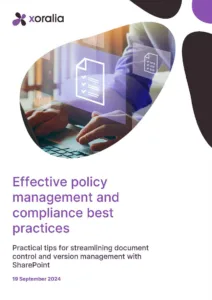Policy management software: the buyer’s guide
- Dan Hawtrey

Policy management software: the buyer’s guide
Managing policies is important in every organisation, and absolutely critical in particular sectors which either have prominent areas of risk or are regulated. These sectors cover everything from financial services to construction to charities.
Across many industries, policy management software is often identified as a potential solution when organisations find they are:
- spending too much time managing the administration of policies
- the business has important safeguarding and policy management responsibilities and wants to minimise their risks.
While identifying the need to buy policy management software is relatively straightforward, choosing the right software is less so. Customers often ask us what the key features of policy management software are and want to know how to evaluate the right solution. In this article we’re going to explore how to buy policy management software, looking at the key features to watch out for, the process for evaluation, and other things that buyers need to consider.
What is policy management software?
We define policy management software as “any solution which helps policy owners and digital workplace teams effectively manage their content throughout its lifecycle, ensuring it is up-to-date, accurate and effectively distributed to users.”
On top of capabilities that deliver around the policy management lifecycle, there are usually additional features that support employee attestation, a more sophisticated search, integration with other systems and so on. Policy management solutions like Xoralia go beyond the basics and provide highly useful extras that make life easier for teams managing policies and the users accessing them.
What key features should policy management software have?
Policy management software will have a number of core features, as well as the various “extras” that add value. It’s important to know what these features are to be able to evaluate the right solution. Below we explore the main features of a policy management solution as well as the value-added components; note that all these capabilities are available with Xoralia.
Does it provide a central controlled library for distribution of documents?
Distribution and dissemination are key elements of policy management. An effective policy management solution should include a document library from where anyone in the organisation can access the policies they need. Potentially this could be integrated into an organisation’s intranet.
This document library must also include the right governance and controls to ensure only nominated policy owners and administrators can upload and update specific policies. It should also have elements such as automatic version control and numbering, and also the ability to restrict certain policies and procedures to different audience groups.
Does it have a powerful search?
Making your policies findable and discoverable is key. A good policy management solution will have a dedicated search using document titles and departments, while also being filterable on meaningful data such as policy owner, category and so on. Having strong findability means that employees can find what they need and makes it more likely they will engage with policies.
Does it allow for custom labels and tags?
Every organisation is different and will want to present their policies to users in custom ways. Policy management software should therefore be flexible and allow you to add custom labels and tags to policies to categorise and present your library of policies in different ways to users.
Does it have personalised views?
Support for personalisation is a must-have feature for any policy management software. Not every policy is going to be relevant for every employee, and when a user views a policy and procedure library, they should only see the policies that are targeted to them based on their profile (location, division etc.) and in terms of any action required, such as mandatory reads. In Xoralia, we created personalised views for users, but also for policy managers who can see what they need to do to manage the policies they are responsible for.
Does it support policy owners through the policy management lifecycle?
Your solution should actively support policy owners in manging their policies throughout the policy management lifecycle, covering everything from creation and distribution, through to reviewing and updating with new versions, to eventually retiring and replacing a policy.
Various features will support this including permission management to ensure only nominated policy owners and admins can manage particular policies, automatic review reminder notifications, approval workflow for policies, document versioning and the ability to archive policies.
Can it support an employee attestation process?
An important feature of policy management software is support for the employee attestation process. This underpins compliance with policies that are mandatory to read, by ensuring that employees confirm they have read the policy in question. The software manages the attestation process end to end by providing the facility for mandatory reads, but then also providing the reporting to keep track of progress.
Involved in this are several features:
- The ability for admins to easily set up a mandatory read for a policy and assign it to different groups, ideally those that are already set up in Active Directory (if using that)
- The ability for users to view the policies they must read and add their confirmation that they have done so
- The ability to view progress on who has confirmed they have read the policy, and to segment this by different groups so department and team managers can take action if necessary
- The ability to send out automated reminders to those still to complete the attestation process.
Can users preview documents in the solution?
It might sound like a small feature but in the employee attestation process, it helps if an employee can preview and read a document within the policy solution itself. This helps to encourage users to complete the attestation process when they receive the notification and helps push up the proportion of employees who have read policies.
Does it also have a flexible quiz builder?
Not all policy management software has an additional feature that not only supports attestation but also validates the knowledge of employees to make sure they have actually read a policy. In Xoralia our new flexible quiz builder allows document owners to create custom questions, use question pools and set a pass mark to ensure employees have read and understood a new policy.
Does it automate reminders and notifications for users and policy owners?
Notifications to remind users and policy owners that they need to read or review a policy is also an essential feature of policy management software, underpinning policy management and employee attestation processes. In Xoralia we have recently improved our notifications by making them more customisable, for example so you can create an alias email address that appears as the sender.
Does it have a reporting suite?
The ability to report on various different aspects of policy management is another core feature of a good policy management solution. For example, within Xoralia we have a suite of reports that features who has and hasn’t read a particular policy, with the ability to segment by department. This will help you track document lifecycles and their validation history, as well as the read status on a per user or per department basis. This reporting feature also helps to drive compliance by showing external parties that your employees have read a new policy. Other dashboards and views can also help users. For example, allowing users to review their own “read” history and their next set of deadlines, all in one place.
Can it work with SharePoint and Microsoft 365?
For any organisation working with SharePoint intranet or Microsoft 365 digital workplace, the ability for a policy management solution to integrate with the wider digital place has enormous benefits. For example, with Xoralia you can integrate it seamlessly within a SharePoint intranet, and even use an existing SharePoint library to include in Xoralia.
We’ve also gone one further by creating a handful of Xoralia web parts that can exposed on a SharePoint site or intranet covering:
- All documents within the policy library
- All the mandatory documents that must be read by an individual user
- All the documents that a policy owner or admin is responsible for and any related review dates.
Can it work with Azure Active Directory?
Working with Azure Active Directory is also important, not only underpinning Single Sign-On through Microsoft 365 identities but also for administrators who are likely to want to target policies to existing AAD / Microsoft 365 groups.
Can it integrate with Microsoft Teams?
Microsoft Teams has enjoyed huge levels of adoption and in some organisations it’s where many employees are spending much of their working day. The ability for a solution to integrate with Teams means policies are readily available directly in the flow of work. Xoralia now has a Teams app so the solution can be fully consumed within Teams.
Can it integrate with Microsoft Viva?
Microsoft Viva is a new employee experience platform accessed through Teams, that is attracting a lot of interest from digital workplace teams. Here at Xoralia we’ve also created two cards that can slot into the Viva Connections dashboard; these cover policies that must be read by users, and policies that are due for review by policy owners and admins.
Can you automate policy management relating to employee onboarding?
When a new employee joins your company they often have to read particular policies and confirm they have read them. Ideally, policy management software should include features that automates the onboarding process so that when a new person joins they automatically receive notifications to read the relevant policies.
With Xoralia, we’ve fully automated onboarding by ensuring that when a person is put into a particular AD or Office 365 group they then will then receive relevant notifications. This means any new starters or movers within your company will be asked to read the right policies – meaning that you really can “set and forget”.
Does it have audit tracking for compliance purposes?
The need for regulatory compliance or the need to demonstrate compliance to meet certification standards is a significant factor in policy management, and can be useful in legal, regulatory or certification processes. Robust policy management software should support all your compliance processes, including full audit tracking. For example, Xoralia provides a full audit trail around employee attestation that can also be downloaded to Excel. As document libraries are also based on SharePoint it also means that actions around different documents can also be tracked.
Does it have a freemium product license?
Often policy owners, IT functions and intranet managers want to see a product in action before making a purchasing decision. A product with a freemium license option can provide an excellent way to “try before you buy”. This is something which we’ve introduced into Xoralia – you can test all our features excluding branding customisation and report extracts, for an unlimited amount of time.

Considering the impact of policy management software
Beyond the features of the product, there are also a range of other non-functional areas to consider to ensure that the potential policy management software ticks all the right boxes.
Does it integrate with your existing systems?
Ideally, you’ll want your policy management software to integrate with your existing digital workplace and technology stack, and it’s likely that this will be on your IT function’s evaluation checklist. We find this is a particularly important question for organisations that have deployed Microsoft 365 and SharePoint Online, and this is one of the key reasons they choose Xoralia, which is built on SharePoint and Microsoft technologies. For many organisations the question “Is the solution based on Microsoft 365 technologies” is effectively the same as “Does it integrate with your existing systems”?
How will the staff and team cope with the new system?
Policy management software must be sustainable, so it’s important to consider the usability and accessibility of any new product. This is critical both from an end user and administrator standpoint, and it was a key consideration for us when designing Xoralia; we knew it was essential to make the product intuitive and easy to use.
How will staff learn to use it?
You’ll also want to make sure that there is training in place for the administrators of the policy management software. Here at Xoralia we offer product training, usually delivered remotely by one of our training team using screen sharing software like Microsoft Teams.
What about other support?
Depending on your needs, you’ll also want to know that there is support for your product. Again, we have a support team who can deal with all enquiries and issues, including guiding you through any installation.
Is the solution secure?
An important evaluation point in assessing any software is security – and this is an area that cannot be compromised on. One of the reasons why some customers choose Xoralia is that it is integrated into their existing Microsoft 365 digital workplace, so it is subject to the same stringent security and identity management processes that govern the M365 ecosystem.
Is the software easy to manage?
The ease of managing any solution will also be a consideration. Here, many teams want a cloud-based solution available as Software-as-a-Service (like Xoralia) where the vendor does virtually all the heavy lifting in terms of upgrades, security patches and other changes.
What is the best policy management software for me?
To work out the best policy management software that fits your specific needs, it helps to stick to a process that will help you define your requirements, review a product, and then make a final decision. Generally, a product evaluation process will follow these steps:
- Carry out research: speak to your stakeholder and users and define exactly what you need out of the policy management solution.
- Make a list of requirements: Based on your research, work out a list of requirements for the software – you might prioritise these including those that are “must have” features.
- Identify a product or products: Research the market to find suitable solutions.
- Map the product features to your requirements: Ensure any potential solution has the features you need.
- Get a demo: arrange a demo of the software to understand its potential and ask any questions.
- Compare your products: If reviewing more than one product, compare them to see which is best one. Here involve the right stakeholders and use a MoSCoW evaluation if necessary.
- Make the final decision: good luck!
Buying policy management software
Buying policy management software is relatively straightforward but there are various different aspects to consider in finding the right solution for you. We hope you’ve found this buyer’s guide useful. If you have any questions get in touch or arrange a free demo.
The story behind Xoralia
 Xoralia was built by the team at Content Formula, an intranet and digital workplace consultancy that has built SharePoint intranets for some of the world’s most famous companies. Now, most companies want their policies and procedures on the intranet but they don’t just want to store them there, they also want tools to help better manage them. Over the years we came across just about every single requirement for a policy management system. As this article above explains, there are gaps in SharePoint and so we never built what in our mind was the perfect policy management system.
Xoralia was built by the team at Content Formula, an intranet and digital workplace consultancy that has built SharePoint intranets for some of the world’s most famous companies. Now, most companies want their policies and procedures on the intranet but they don’t just want to store them there, they also want tools to help better manage them. Over the years we came across just about every single requirement for a policy management system. As this article above explains, there are gaps in SharePoint and so we never built what in our mind was the perfect policy management system.
However, one of our clients challenged us to build something for them that filled all the gaps but still used SharePoint at the back end. We had a great relationship with them and agreed to share the budget to do this, provided we could then market the solution to others. That was in 2019. We’re now on version 3 of Xoralia and the product has grown and evolved a lot.
3 benefits you can expect from Xoralia
Make it easy to find policies
Centralised policy library with powerful search and filtering.
Reduce administrative burden
Automations and notifications so that all policy tasks are carried out on time
Demonstrate compliance and best practice
Sophisticated tracking and dashboards to drive and measure compliance.
And lots more!
What our clients say

AppSource review
A great time saver and tool for document management

Tim Galer
IT Coordinator
Hughes
Ideal partner for our regulated environment

Adam Lythgoe
IT Manager
LifeArc
How to get started with Xoralia
Step 1: request a demo
Fill out our form and we will be in touch to arrange a time. You can even book a time yourself.
Step 2: get a price proposal
If you think Xoralia is for you ask us for a quote. This will set out any options you may have.
Step 3: install and launch
We’ll install Xoralia in your environment (or you can do it yourself). We’ll provide training and support to get you up and running quickly.
Here's what you'll get
-
Central policy library
-
Search and filter tools
-
Mandatory read policies with attestations
-
Quizzes
-
Notifications and alerts
-
Employee dashboard
-
Line manager dashboard
-
Works on mobile, in Teams and SharePoint
-
New policy creation workflows
-
Policy update workflows
-
Review and approval gates
-
Policy version history
-
Compliance dashboard
-
Audit trail
-
Full reporting
And last but not least:
-
Professional implementation service and support
-
Evergreen software – frequent updates and improvements
-
Comes with our "it just works" support warranty – we’ll fix any bugs, often before you even notice
Ready to get started?
Connect with us to streamline your policy management and ensure effortless compliance.

AppSource review
Uniting excellence in integration and features for seamless policy management

Rian Stuart
IT Manager
TwinStream
